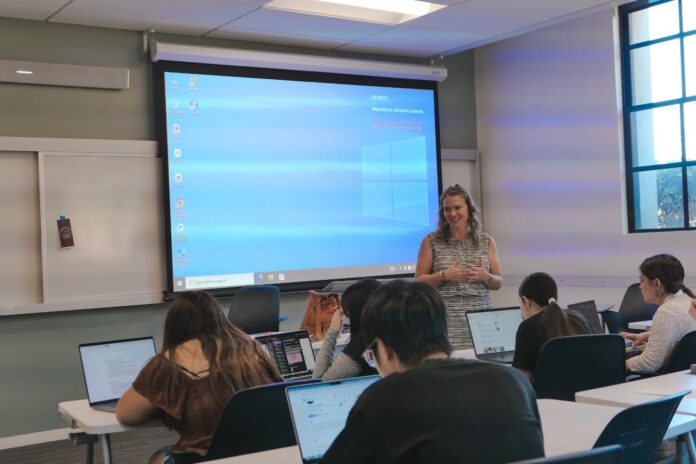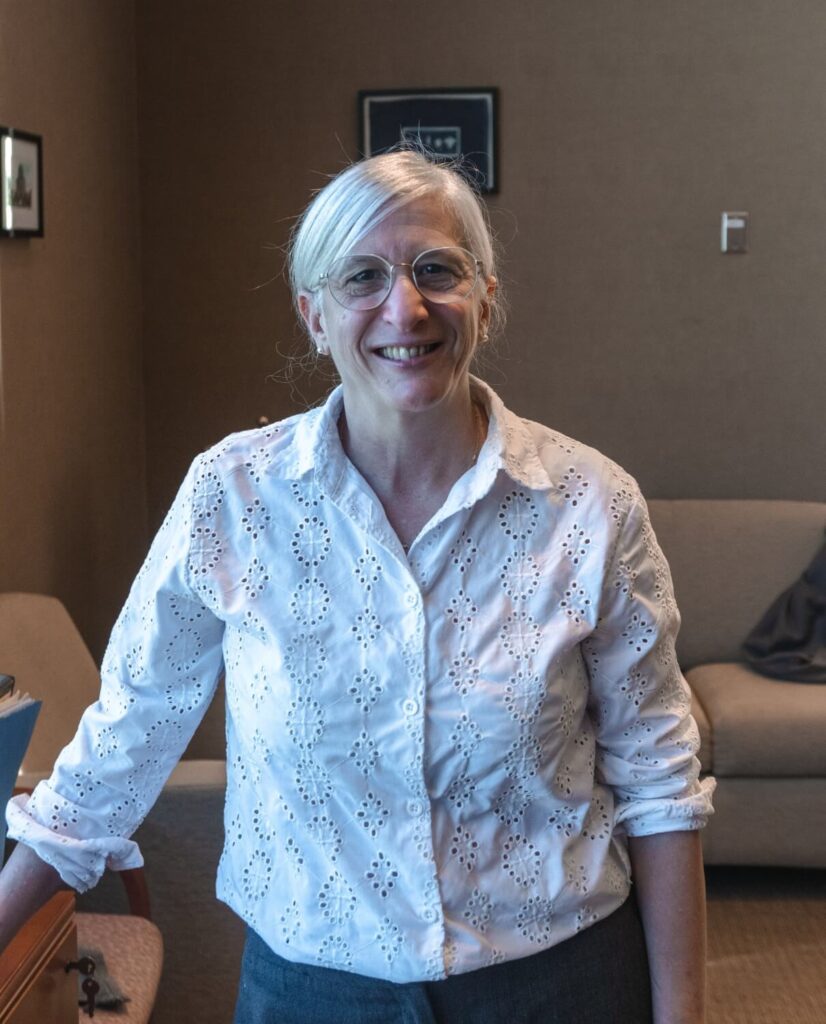
As President Harry Elam’s tenure comes to a close at the end of the 2023-2024 school year, Occidental is culminating an administrative and academic project led by Elam called The Occidental Promise. Vice President for Academic Affairs and Dean of the College Wendy Sternberg said The Occidental Promise includes a plan to remodel the school’s First-Year Seminars (FYS) by having tenure-track and resident faculty teach FYS classes.
Sternberg said the new FYS model will help first-year students establish long-term relationships with continuing faculty and more easily transition into the Occidental community.
“We really want that group of 16 students and that faculty to feel that there is a community in that classroom,” Sternberg said. “The distinction in this new model for FYS is that it’s really about connecting students to the Occidental community and to a faculty member; we want continuing faculty to be participating in that program.”
Sternberg said the remodeling comes at a time when recent student surveys have shown that a handful of students still didn’t feel quite at home at Occidental, despite liking the college’s academics.
“We had more students than we would like saying that they didn’t have a strong sense of belonging,” Sternberg said. “At the same time, students had very high satisfaction with the academic program.”
According to Sternberg, the new model should address this issue by creating more long-term relationships both among students and between students and faculty.
“With a program like this, students can at least feel like there is a faculty member they can turn to or that there are other students that are not maybe their roommates,” Sternberg said. “We’re really hoping that the FYS [classes] becomes a space where students can feel a sense of belonging and a shared sense of academic purpose.”

Sternberg also said the faculty workload has become increasingly onerous in recent years, but the FYS remodeling should be able to accommodate this issue by providing extra teaching credits for teaching FYS classes and implementing immersive learning practices.
“Faculty are already so taxed,” Sternberg said. “So, what we’re trying to do is to provide additional teaching credits for the activities that are really time consuming.”
Sternberg said she doesn’t see the plan as a redressing of issues with the school but instead a refinement of the college’s strengths.
“We are not taking advantage of the faculty that we have, and their desire to be in that mentoring role,” Sternberg said. “We’ve got such dedicated faculty who are so dedicated to and supportive of our students. There is a place for all of the students that choose to come here, and we want everybody to be able to find it.”
Biology professor and Occidental’s Faculty Council President for the 2023-24 school year John McCormack said that faculty were involved but not everyone was included.
Professor Mary Christianakis, co-chair of the Critical Theory & Social Justice (CTSJ) department, said that she thinks there should have been more faculty involved in discussions about the new FYS plan.
“There’s been a major curricular change, [and] the faculty has not gotten to vote on it,” Christianakis said. “It is a top-down mandate. It’s forced upon us.”
Christianakis also said the remodeling will lead to harmful curricular losses across all academic departments, as long-term faculty may have to cut certain course offerings in order to make room for the new FYS plan.
“We have been told, as department chairs, that we need to cut our majors down to have fewer classes so that we can make this FYS possible,” Christianakis said. “We are cutting our majors down and taking our tenure-track and tenured faculty [and] mandating their participation in FYS. And we’re being told to put adjunct faculty to staff our majors.”
According to Christianakis, this will lead to a mismatch of expertise in who is teaching what course. She said long-term faculty with specialized expertise in their major area may not be well suited to teach an FYS, which places an emphasis on writing skills, and adjunct faculty may not be well suited to teach high-level course offerings for majors.
“Our expert faculty, who are tenure-track, are going to be teaching writing, whether or not [they’re] experts in teaching writing,” Christianakis said. “And we’re being told to cut down and to staff our content areas with adjuncts, who are wonderful, but we also want to be staffed in our department.”
Dean Sternberg said that she does not anticipate any curricular losses associated with the plan to be significant in the long run and that academic department heads will still have autonomy over how to manage their courses. She also said that The Occidental Promise includes a plan to hire more tenure-track faculty, which will offset any dramatic curricular losses over time.
However, Christianakis said smaller academic departments may be impacted disproportionately, as fewer faculty means less bandwidth to adjust for the new, mandatory FYS offering.
Christianakis also said she questions the new FYS model’s ability to foster a stronger Occidental community and that she believes there are better community-building alternatives that the college used to implement.
“Taking students and putting them in [a] community doesn’t mean that they feel community at Oxy,” Christianakis said. “When I first came to the college, this was 21 years ago, I actually would go into the dorms to hall spreads and give a talk. And several of us did. There are lots of ways to build community.”
Christianakis said she does believe in immersive, high-impact educational practices that place an emphasis on real-world experiences. However, she said the FYS planned implementation of them, which may require consistent field trips into LA, is impractical.
“What happens if a student can’t get there? We’re going to have 400, 500 students going up,” Christianakis said. “Some people don’t have cars. Some people don’t drive there; where are they going to park? If they’re going into cities, who’s going to take on that liability?”
According to Christianakis, using high-impact teaching practices without restructuring course offerings is possible, and the CTSJ department is proof of that.
“CTSJ has somehow figured out a way to incorporate internships and community opportunities without compromising the expertise of the tenure-track faculty by leveraging really authentic community relationships,” Christianakis said.
McCormack said the details of implementing the FYS plan are being refined currently in more working groups, and right now, faculty sentiment is anxious due to the curricular nature of the plan.
“Anytime you’re heading into a restructuring of the curriculum, there’s always concerns,” McCormack said. “You’ve got maybe 20 faculty involved on these working groups that are working out the details of implementation. So, I think without having seen those details, there’s probably a lot of concern right now. I think we’re at the moment of most concern, where there’s been a decision that we’re doing this, but the details are, as yet, unclear.”
Contact Noah Kim at nkim4@oxy.edu
![]()






























